|
|
|
Sort Order |
|
|
|
Items / Page
|
|
|
|
|
|
|
| Srl | Item |
| 1 |
ID:
104352
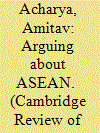

|
|
|
|
|
| Publication |
2011.
|
| Summary/Abstract |
This article argues that ASEAN has been, will remain, an essentially contested institution. No one has claimed, or could claim, that ASEAN is a flawless organization, but at the same time, the characterization of ASEAN as a dysfunctional entity or a talk shop is misplaced. The reality lies in taking the middle ground as the articles in this special issue show. Research and debate on ASEAN should be based on comparing its record with other regional associations in the developing world and using some agreed criteria about what success or failure means. And disagreements about ASEAN's role should be welcomed as part of a healthy debate.
|
|
|
|
|
|
|
|
|
|
|
|
|
|
|
|
| 2 |
ID:
104346


|
|
|
| 3 |
ID:
104349
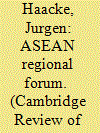

|
|
|
|
|
| Publication |
2011.
|
| Summary/Abstract |
This article examines to what extent the Association of Southeast Asian Nations (ASEAN) Regional Forum (ARF) has moved beyond dialogue to practical security co-operation. Focusing on terrorism, maritime security and disaster relief as key areas of ARF activities in the past few years, the paper offers four arguments: first, while the ARF primarily remains a forum for regional security dialogues and confidence building, its participants have slowly become prepared to proceed with practical security co-operation, albeit only in limited ways. To the extent that desktop and field exercises take place under ARF auspices, most have been organized in the area of disaster relief. This implies, second, that for the most part ARF participants are still pursuing capacity building and operational security responses outside the Forum. Third, the ARF's cautious embrace of practical co-operation is not the outcome of ASEAN's exercise of diplomatic centrality but the result of initiatives pursued by a small group of ASEAN and some non-ASEAN states. Fourth, at least in the short term, any expectations that participants might organize significantly more demanding practical activities under ARF auspices are premature.
|
|
|
|
|
|
|
|
|
|
|
|
|
|
|
|
| 4 |
ID:
104344


|
|
|
|
|
| Publication |
2011.
|
| Summary/Abstract |
The intention of this brief introductory essay is to set the scene for the papers in this special collection, by providing some basic background for the subsequent discussion, and by highlighting the key debates that have divided scholars working on Southeast Asia in general and on ASEAN in particular.
|
|
|
|
|
|
|
|
|
|
|
|
|
|
|
|
| 5 |
ID:
104347
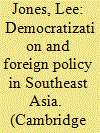

|
|
|
|
|
| Publication |
2011.
|
| Summary/Abstract |
Recent democratic transitions in Southeast Asia raise the question as to how we should theorize the relationship between democratization and foreign policy. Many scholars assume that more 'democratic' Association of Southeast Asian Nations (ASEAN) members pursue more 'liberal' policies than their less-democratic counterparts, but surprisingly little theoretical work investigates the connection. This article argues that such investigations tend to crumble under close scrutiny. Instead, it offers an alternative framework based on an analysis of how different socio-economic interests contend to shape foreign policy in ASEAN states and how these interests are able to organize politically to impose their preferences. The case study of the ASEAN Inter-Parliamentary Myanmar Caucus, a regional network of legislators campaigning for liberal-interventionist policies on Myanmar, shows how it is these forces, and not the mere presence or absence of formally democratic institutions, that govern the political space available to those seeking to transform ASEAN states' policies.
|
|
|
|
|
|
|
|
|
|
|
|
|
|
|
|
| 6 |
ID:
104354
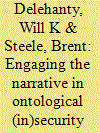

|
|
|
|
|
| Publication |
2011.
|
| Summary/Abstract |
Ontological security theory (OST) provides a unique account of how state Self-identity is formed and reformed in international relations. OST postulates that state Self-identity is usefully understood by inquiring into the foundation of a state's sense of Self: its autobiographical narrative. We seek to amend this line of argument by further suggesting that the autobiographical narratives of states are 'gendered'. Feminist theorizing about the relationship between gender and power implies that the dominant autobiographical narrative of state Self-identity is 'gendered' masculine. The power of this masculinized autobiographical narrative flows from an 'internal othering' process of counter 'feminine' autobiographical narratives that exist alongside the masculinized autobiographical narrative. Our goal is to suggest that opportunities do arise for counter 'feminine' narratives to challenge the dominant autobiographical narrative due to their interdependence and we explicate two practices by which masculinized narratives can be engaged, challenged and disrupted.
|
|
|
|
|
|
|
|
|
|
|
|
|
|
|
|
| 7 |
ID:
104353


|
|
|
|
|
| Publication |
2011.
|
| Summary/Abstract |
Financial crises underline the necessity for more effective global governance. Despite the creation of the Basel II Accord, no agreement has been reached on the reform of the International Monetary Fund (IMF). Why do governments only selectively agree to reform global governance? I argue that convergence and divergence of governmental positions cannot be explained solely by the logic of the international system, institutions or globalization. Instead, they strongly reflect domestic ideas and interests. Furthermore, the ability of governments to compromise internationally is influenced by the different impact of domestic ideas and interests. With regard to their prevalence in domestic preference formation, ideas prevail when governance affects lobby groups diffusely and poses fundamental questions on the role of politics in governing the economy. Interests prevail when lobby groups are affected directly and new governance concerns a specific distribution of costs. These arguments are tested on the preference formation of the United States and German governments on the IMF and Basel II.
|
|
|
|
|
|
|
|
|
|
|
|
|
|
|
|
| 8 |
ID:
104348
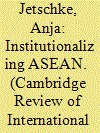

|
|
|
|
|
| Publication |
2011.
|
| Summary/Abstract |
This article provides a new piece for two of the puzzles of institutionalized cooperation in Association of Southeast Asian Nations (ASEAN). First, with regard to the organization's four decades of existence, there has always been a marked gap between ASEAN's rhetorical goals of cooperation and its actual achievements. What explains these systematic failures of implementation? Second, from the outset, ASEAN was criticized for its light institutionalization, which failed to deliver the substantial cooperation goals. Despite selected institutional reforms, ASEAN's autonomy has not increased remarkably and it has not made any major institutional innovations. Why does ASEAN design institutions it does not use? Why does this transformation gap occur? The author suggests a sociological institutional explanation and argues that major impulses for cooperation have come from outside Southeast Asia, most importantly from Europe. By mimicking the European integration process, ASEAN member states have effectively created an isomorphic organization. The Association's institutional development reflects a concern for international legitimacy and less an objective functional demand arising from the specific interactions of member states. This copying process has led to network governance within the organization.
|
|
|
|
|
|
|
|
|
|
|
|
|
|
|
|
| 9 |
ID:
104350


|
|
|
|
|
| Publication |
2011.
|
| Summary/Abstract |
The Association of Southeast Asian Nations (ASEAN) is an established player in Southeast Asia, while the Shanghai Cooperation Organisation (SCO) is an emergent force in Central Asia. This article comparatively assesses ASEAN and SCO to investigate the nature of each organization's model of cooperation and their utility in the contemporary political landscape in Asia. It argues that SCO differs from ASEAN on a few significant points: its composition and level of institutionalization. At the same time, both organizations have similar agendas and models of cooperation, emphasizing a common spirit, flexibility and a focus on regime security. The paper concludes that ASEAN's model of cooperation continues to be relevant to the contemporary Asian landscape, and its brand of loosely codified, informal and norm driven multilateralism continues to be durable and robust.
|
|
|
|
|
|
|
|
|
|
|
|
|
|
|
|
| 10 |
ID:
104351


|
|
|
|
|
| Publication |
2011.
|
| Summary/Abstract |
Asian economies' prospects for upward mobility within the global division of labour hinge significantly on the degree to which transnational corporations' (TNCs) global production networks (GPNs) accommodate or hinder their efforts to shift from simple production into more remunerative roles. A growing literature notes the rise in various countries of a 'neo-techno-nationalism' that aims to bolster local innovation and challenge TNCs' technologically derived leverage over the distribution of roles and rewards within GPNs. Industrial and technological policies in Southeast Asia, however, reflect a quite different 'techno-glocalist' strategy. Such strategies are based on a 'governance bargain' in which host governments, in exchange for technological upgrading, facilitate TNCs' exercise of governance authority transnationally as well as in coordinating local investments in innovation and other cluster-building activities. They highlight a conceptual distinction between the degree of internalization and hierarchy within networks that is typically elided in theories of GPN governance.
|
|
|
|
|
|
|
|
|
|
|
|
|
|
|
|
| 11 |
ID:
104345


|
|
|
|
|
| Publication |
2011.
|
| Summary/Abstract |
This article explains East Asian regionalism as the product of two sets of negotiations. The first negotiation is between East Asia on the one hand and global forces and structures on the other. The second negotiation is intra-regional and includes a critical negotiation between the Association of Southeast Asian Nations (ASEAN)-Southeast Asia and East/Northeast Asia, which also provides the primary focus of this article. This article details ASEAN's extensions into East Asian regionalism as part of interdependent efforts to adapt transitioning global and regional systems. Conceiving these regional negotiations to be not just economic and utilitarian but first and foremost normative, this article details the opportunities and dilemmas represented by 'East Asia' for ASEAN, ASEAN-Southeast Asia and Southeast Asia as a meaningful organizing principle. Dilemmas associated with the ASEAN Plus Three process, an East Asia free-trade area and the ASEAN Charter provide illustrations of East Asia's understood challenges for Southeast Asia in addition to the ways that Southeast Asian agencies have been shaping the form and content of recent East Asian efforts and also how regional-global and intra-ASEAN negotiations continue to provide key constraints.
|
|
|
|
|
|
|
|
|
|
|
|
|
|
|
|
|
|
|
|
|